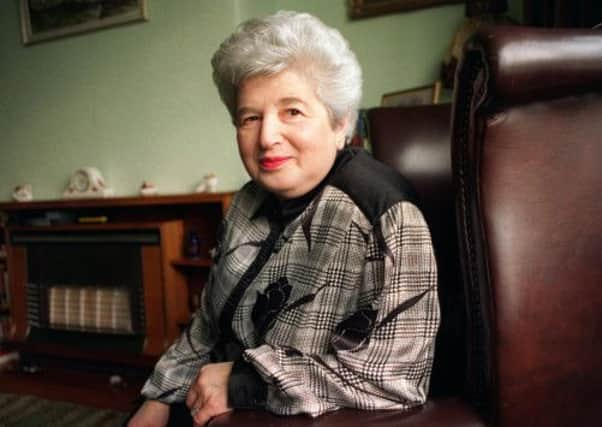Edith Goldberg


As 11-year-old Edith Michel she arrived in Leeds with her younger sister Irmgard – both were to find safe havens with two Jewish families.
Born in Kaiserslautern on May 13, 1928, she grew up in a little village in Teschenmoschel, which had a population of around 200, of whom only 20 were Jewish.
Advertisement
Hide AdAdvertisement
Hide AdHer family were farmers and her childhood was carefree – hay-making in the summer and tobogganing in the winter.
Kristallnacht was a trauma that Edith never forgot. On that fateful night of broken glass the family heard loud knocking at the door in the early hours of the morning.
Two Gestapo men in plain uniform took away her father and uncle while Irmgard was sleeping and frightened Edith sat on the stairs listening.
The men were taken to Dachau concentration camp but returned home sometime later, never to speak about their experiences.
Advertisement
Hide AdAdvertisement
Hide AdEverything in the local synagogue was taken outside and torched.
After Kristallnacht the Nazis dictated that all Jewish children had to leave school.
Edith’s mother worked relentlessly to get her daughters out of Germany, contacting the refugee committee in England.
In May 1939, the two sisters were taken by their parents to Frankfurt station as part of the Kindertransport programme, which allowed some children to leave Germany.
Advertisement
Hide AdAdvertisement
Hide AdThat was to be the last time the siblings ever saw their mother and father.
The sisters joined some 200 other children at Frankfurt station and went by train to Rotterdam – their destination was Leeds.
Their parents remained in Teschenmoschel until 1940 when they were deported to Camp de Gurs in the Pyrenees. In 1942 they were transported to Auschwitz and were never seen again.
The children arrived at Harwich on May 18 just five days after Edith’s 11th birthday and two days prior to Irmgard’s ninth birthday, neither speaking a word of English.
Advertisement
Hide AdAdvertisement
Hide AdOn arrival in Leeds Edith and her sister were met at the city’s station.
The two, bewildered innocent “kinder” were taken to meet their new foster parents – two families who were neighbours in Chapeltown.
Edith lived with the Craskin family while her sister resided next door with the Freeman family. They were soon enrolled at Cowper Street school where there were a handful of refugee children.
Edith stayed with her adoptive family until her marriage in 1951 to Jack Goldberg, whom she met while he was on leave from the army.
Advertisement
Hide AdAdvertisement
Hide AdThe couple went on to have two children Malcolm and Lynne and three grandchildren.
Edith gained employment at Schofields departmental store in Leeds, one of the youngest to work on the shop floor rather than the workshop.
She left Schofields when Jack opened a delicatessen and provisions store in Chapeltown Road.
The business eventually relocated to Street Lane under the name Modern Food Stores, a traditional Jewish grocery and a community hub.
Advertisement
Hide AdAdvertisement
Hide AdEdith was one of the Holocaust Survivors’ Friendship Association’s greatest supporters.
It was only in the past five years that she decided to tell her story. She began to speak in schools, to children who were the same age as she was when she left her homeland.
Edith – who is survived by her husband – was proud to participate in the association’s nationally acclaimed Heritage project, The Holocaust: Sustaining the Legacy.
The project trains the next generation of volunteer Holocaust educators, including her own granddaughter Jodie.
Advertisement
Hide AdAdvertisement
Hide AdHSFA chairman Lilian Black recalls Edith sharing “that indomitable spirit and quiet dignity” often seen in Holocaust survivors.
She was admired for overcoming the tragedy of her loss of family and country and went on to tell her life story in print and video.
“She considered herself to be so lucky to have found a wonderful foster family who treated her the same as they did their own children,” said Ms Black.
“She was totally committed to sharing with young people her experiences of what persecution meant for her and her family.”
Advertisement
Hide AdAdvertisement
Hide AdEdith’s inspirational story will now be used for future educational purposes, most importantly to show the true spirit of those, like her, who overcame great adversity with courage and fortitude.
“She was a remarkable woman who leaves a wonderful legacy,” added Ms Black.